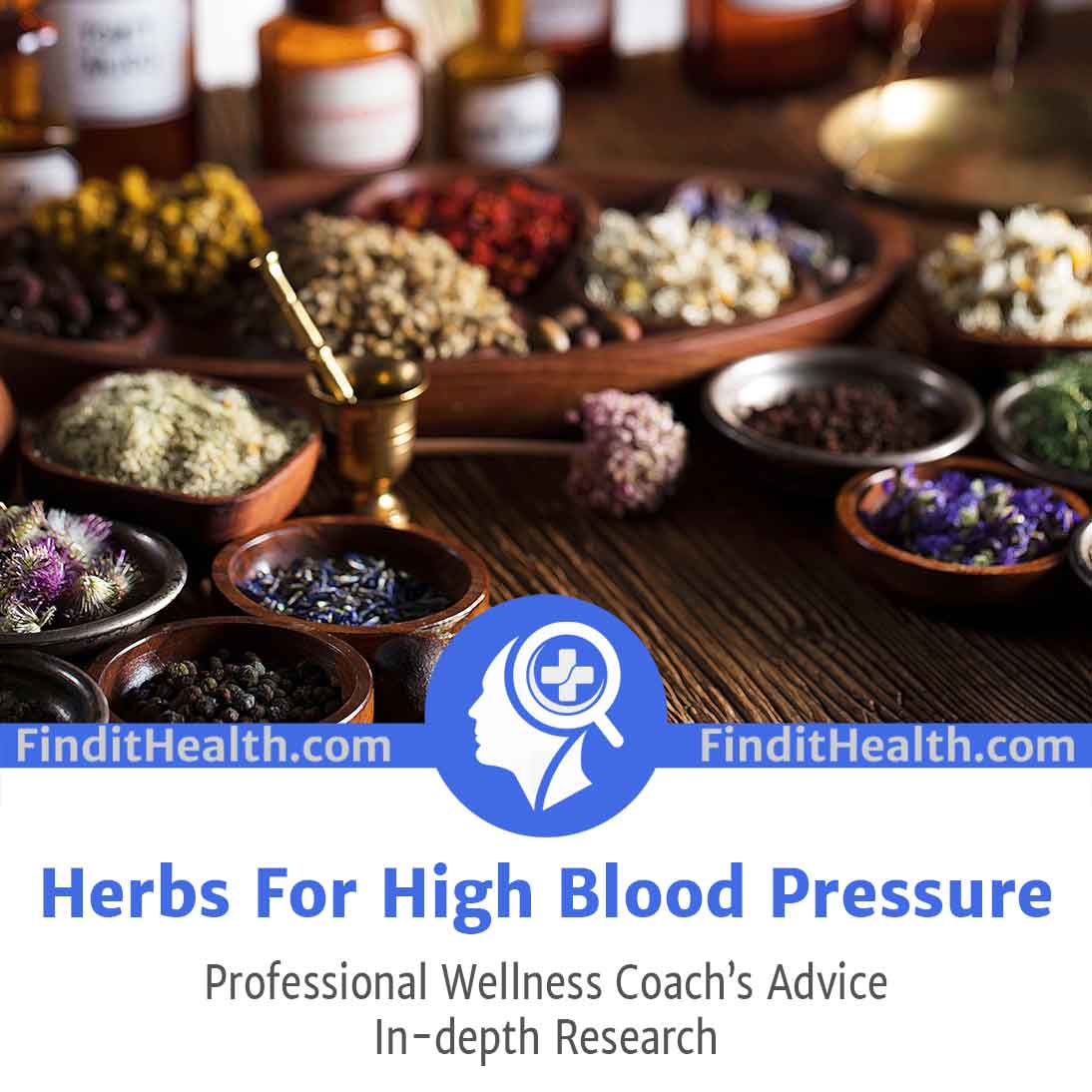
As the head of the Wellness Coach team at Find It Health, I’m dedicated to guiding you through your wellness journey. Through in-depth research, we will highlight herbs often cited for their potential in regulating high blood pressure.
In a study published in the National Library of Medicine conducted by Tabassum, N. and Ahmad, F. 2011, certain herbs were found to reduce high blood pressure effectively.
With that in mind, it is our mission to provide you with accurate, evidence-based information on everything we offer. However, before making any changes to your regimen, be sure to consult a healthcare professional. Your health is our utmost priority.
Natural Herbs For High Blood Pressure
High blood pressure, or hypertension, has been rightly termed a ‘silent killer‘.
However, nature, in its bounty, provides several herbs to manage this condition. Let’s break it down:
1. Hawthorn
- Benefits: Recognized for its impact on blood vessels, Hawthorn promotes smoother blood flow, enhancing overall heart health.
- Application: Consumable in teas, tinctures, or capsules.
- Why it matters: Regular consumption can significantly reduce the risk of heart disease.
2. Garlic
- Benefits: Beyond its culinary appeal, garlic stands out for its ability to maintain healthy blood pressure levels.
- Application: It’s most effective when consumed raw or as herbal medicine supplements.
- Why it matters: Regular intake can help prevent the onset of cardiovascular diseases.
3. Ginger
- Benefits: Not just for digestion, ginger assists in dilating blood vessels, promoting optimal blood flow.
- Application: Incorporate as a fresh root in meals, or consume in teas.
- Why it matters: By aiding blood flow, ginger supports heart health.
4. Lavender
- Benefits: More than its calming aroma, lavender plays a pivotal role in blood pressure regulation.
- Application: Breathe in its scent, use in teas, or diffuse its essential oil.
- Why it matters: It diminishes stress, a primary factor elevating the risk of heart attack.
5. Turmeric
- Benefits: Celebrated for its anti-inflammatory benefits, turmeric also aids in maintaining stable blood pressure levels.
- Application: Mix it into dishes, or drink as a warming tea.
- Why it matters: The compound curcumin in turmeric offers protection against cardiovascular diseases.
6. Flaxseed
- Benefits: Laden with Omega-3 fatty acids, flaxseed is pivotal for cardiovascular health.
- Application: Grind and sprinkle on meals or use in oil form.
- Why it matters: Consistent ingestion can significantly curb the risk of heart disease.
7. Basil
- Benefits: The delightful herb basil goes beyond culinary uses; it’s a sentinel for heart health.
- Application: Fresh basil can be sprinkled over dishes or its extract consumed.
- Why it matters: Its active component, eugenol, impacts blood pressure levels directly.
There is no doubt that these natural herbs offer numerous benefits for cardiovascular health. However, it is important to approach these herbs cautiously, ensuring their use is consistent with one’s health profile.
SUBSCRIBE for FREE STRESS MANAGEMENT TECHNIQUES from our EXPERT COACHES!
Herbs That Can Reduce Blood Pressure
1. Cinnamon
- Immediate Impact: While delightful in flavor, cinnamon is also effective in the treatment of hypertension, especially in systolic blood pressure.
- Application: Sprinkle on dishes or consume as a tea.
- Note: It harmonizes well with blood pressure medications but always double-checks with a healthcare expert.
2. Olive Leaf
- Immediate Impact: Olive leaves have demonstrated a potential in reducing both systolic and diastolic blood pressure.
- Application: Extracts are available in supplement form.
- Note: Olive leaf’s positive effects on heart rate make it a heart-healthy choice.
3. Cardamom
- Immediate Impact: Known in traditional medicine, cardamom plays a part in controlling diastolic blood pressure.
- Application: Integrate into meals or consume as a tea.
- Note: While there are limited side effects of herbs like cardamom, always be wary of interactions with blood thinners or other medications.
4. Celery Seed
- Immediate Impact: Beyond culinary uses, celery seed has found its way into the treatment of hypertension.
- Application: Consume its extract or incorporate seeds into meals.
- Note: While beneficial, it’s pivotal not to overlook the effects of herbs and to continuously monitor blood pressure levels when introducing such remedies.
These ancient practices are echoed by modern research, which suggests that these plants possess a great deal of potential.
While the natural path is promising, it’s essential to approach it with caution and knowledge.
Always pair traditional wisdom with current medical advice to ensure a holistic and safe approach to health.
SUBSCRIBE for FREE STRESS MANAGEMENT TECHNIQUES from our EXPERT COACHES!
What Is The Most Effective Herb For High Blood Pressure?
While many seek answers in the field of natural remedies, the pressing question is: What herb reigns supreme in combating this ailment? Let’s explore this topic directly, ensuring that you leave with a clear understanding of the problem.
Understanding The Basics
- Normal Blood Pressure: Ideally, normal blood pressure readings for an adult are around 120/80 mm Hg. Any consistent measurement above this threshold indicates a need for attention.
- Essential Hypertension: This form of high blood pressure doesn’t have an identifiable cause but develops over time. It’s the most common type of pressure in humans.
Garlic: The Herbal Champion
- Effectiveness: Garlic, particularly its active component allicin, has demonstrated abilities to lower blood pressure. Its impact can be likened to that of a mild calcium channel blocker—a common type of medication prescribed for hypertension.
- Consumption: Incorporating garlic into your diet, whether raw, cooked, or in supplement form, can offer these benefits.
- Caution: While garlic stands out as a natural remedy, it’s crucial to remember that sudden drops in blood pressure can lead to symptoms like dizziness or shortness of breath. If experienced, seek medical attention immediately.
Risk Factors & Implications
- Factor For Heart Disease: Persistent high blood pressure is a significant risk factor for heart disease, the world’s leading cause of death. It’s essential to address this with urgency and diligence.
- Symptoms: High blood pressure often operates stealthily, showing no overt signs. However, prolonged hypertension might lead to symptoms like headaches, shortness of breath, or nosebleeds.
Consultation Is Key
- Medical Attention: Before incorporating garlic or any other natural remedy into your regimen, consulting a healthcare professional is of utmost importance. They can provide guidance, especially if you’re on medications like calcium channel blockers.
- Other Considerations: While garlic emerges as a noteworthy herbal remedy, it’s essential to consider other lifestyle changes such as a balanced diet, regular exercise, and stress management techniques to holistically manage blood pressure.
There is a lot to consider when choosing a herbal remedy for high blood pressure, especially when you have no idea which one is best for you. However, it’s important to remember that individual responses may vary.
Although herbs provide a natural means of relief, they should complement, not replace, professional medical advice. It’s important to note that always consult your doctor before taking any herbs or supplements, especially if you’re on medication.
Frequently Asked Questions
What herbs and teas are good for high blood pressure?
Several herbs and teas, such as hibiscus, green tea, and chamomile, have shown potential in managing high blood pressure. Additionally, garlic and olive leaf have gained attention for their potential benefits.
What is the best natural way to get rid of high blood pressure?
The most effective natural methods include maintaining a balanced diet, reducing sodium intake, practicing regular exercise, managing stress through techniques like meditation, and incorporating beneficial herbs and supplements.
What are the best herbs and supplements to lower blood pressure?
Key herbs and supplements include garlic, hawthorn, fish oil, and flaxseed. Coenzyme Q10 has also been noted to have potential benefits in managing blood pressure.
What will bring blood pressure down quickly?
Rapid relief strategies include deep breathing exercises and meditation. However, if experiencing a dangerous spike, seek immediate medical attention. Long-term management involves lifestyle changes and dietary adjustments.
Can turmeric lower blood pressure?
Yes, turmeric contains curcumin, which has been shown to have vasodilatory effects, potentially assisting in reducing blood pressure. However, it should be used with caution if combined with blood pressure medications.
Conclusion
The extensive research, findings, and analyses undertaken by Find It Health’s dedicated team underscore the fact that nature offers a multitude of potential solutions to high blood pressure. However, as with any health endeavor, adopting a balanced and informed approach is essential. In addition, individuals should be mindful of symptoms associated with hypertension, especially if experiencing a dangerous spike, then they should seek immediate medical attention.
With that being said, It is imperative to acknowledge the value of traditional medicine, lifestyle choices, and herbal remedies in managing and mitigating high blood pressure holistically. Ultimately, it is each individual’s responsibility to decide what course of action is best for them and their needs. With informed choices, your wellness journey awaits.

